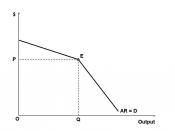Competitive
Non-Competitive
Monopoly
Monopolies the word monopoly is derived from Greek words meaning "one seller." If one company is the only manufacturer of a product, that company has a monopoly. It is able to set its own quality standards and establish selling prices. It can also control middlemen, such as wholesalers and truckers. This does not mean that the monopolist will set the highest possible price for his goods. Market demand will decrease as prices rise. Therefore, the monopolist must set prices that the market will bear in order to make the highest possible profit. The prices will normally be far in excess of actual manufacturing costs and above a normal return on investment.
Natural monopolies this is where the market structure of monopoly is the 'natural' state of affairs in an industry. This tends to happen in industries where the sunk costs are large. The utilities are considered to be natural monopolies, despite the advent of competition.
Oligopoly
Oligopolies this word means, "selling by a few." An oligopoly exists when a few firms have almost total control of the marketing of certain products or services. An
Oligopoly, market is dominated by a few producers or suppliers. It falls somewhere between a situation where there is what is known as perfect competition and one in which there is a monopoly, domination of the market by one producer or supplier. There are a number of ways in which an oligopoly may operate. At one extreme oligopolistic markets may, at least at certain times, be highly competitive. At the other extreme the members of the oligopoly may collude by fixing prices and/or attempting to control the market in other ways, thus producing an outcome that is similar to the one that would occur if a monopoly existed.
Each seller supplies a sufficiently...


